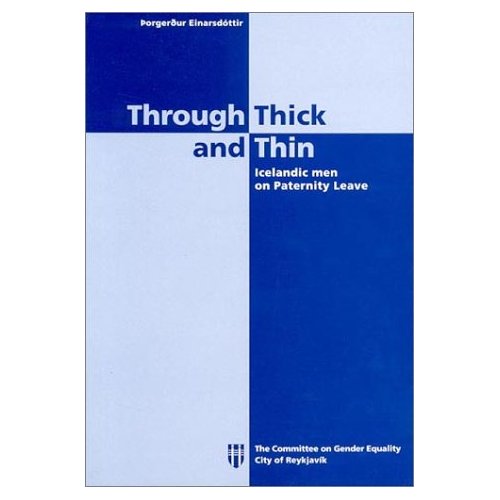It’s no coincidence that Iceland has the most generous paternity-leave program in the modern world—three months!—and also, the smallest wage gap. These things go hand in hand. And no, it wasn’t a raging man-hating feminist who pushed the legislation through—it was a male prime minister, who recognized that Icelanders of both genders would benefit, and not just in the short term. The reasoning? As more men take time off to care for their children, the burden of parenthood no longer falls on women alone. Ultimately, employers will stop looking at young, fertile women and thinking, why bother investing? We’ll all be equally worthy of investment. (Who Needs Men? We Do., Newsweek)
They brought us Ikea, Volvo and Saab. Like the Icelandic people, the Swedes are famous for their progressive programme offerings in Early Childhood Education and care (day care), and have some of the world’s best educated ECE teachers. These provisions enable quality education and care for a future generation of Swedes, caring for the one to six year old, pre-elementary school aged child. These family-centred polices also allow women to return to the workforce and, as a consequence, support economic growth.
“Society is a mirror of the family. The only way to achieve equality in society is to achieve equality in the home. Getting fathers to share the parental leave is an essential part of that.” (Bengt Westerberg, Former Deputy Prime Minister of Sweden)
Since 1974, Sweden has also had a progressive paternity leave programme wherein mothers and fathers can take 14 months off (combined) at up to 80% of the pay, with a guarantee to be able to return to their previously held position. In 1995 the government introduced a non-transferable two months off for fathers which is forfeited should the father choose to not use it. Since the paternity leave programme started, the Swedish birth rate has increased. For American parents these details must seem like something from a utopian dream. Here in British Columbia fathers can take paternity leave; however, the pay rate is lower than 80% and fewer men take advantage of the paternity leave provisions. Parents in British Columbia can receive 100% of their pay rate if they work for an organization that provides a “top up” programme.
For British Columbians, more than the details of the paternity leave, the Swedish and Icelandic programmes are interesting for the validation they provide for men who want to stay home with their children in the early years. Indeed, as the programme states, it is a badge of honour to be at home with your children.
“Machos with dinosaur values don’t make the top-10 lists of attractive men in women’s magazines anymore. Now men can have it all — a successful career and being a responsible daddy. It’s a new kind of manly. It’s more wholesome.” (Birgitta Ohlsson, European affairs minister)
The following benefits are available to Swedish fathers:
– Parental benefit in connection with childbirth is provided for a total of 480 days per child.
– Sixty days are reserved for the father and 60 for the mother. The rest can be shared freely.
– 390 days are paid at 80 percent of the parent’s income, up to a given ceiling.
– The remaining 90 days are at a set daily rate.
– In addition, fathers are entitled to 10 days of paid leave when the child is born. About 80 percent of fathers take advantage of this benefit. (Sweden Fosters Fatherhood, Robin Hincks)
A study reported in the Guardian newspaper highlights the importance of fathers spending a sufficient amount of time with their children in the early years, in particular.
Children are more likely to suffer development problems if their fathers do not take paternity leave or spend enough time with them when they are very young, according to an analysis of thousands of babies born around the turn of the millennium.
A report published today by the Equal Opportunities Commission and based on research tracking 19,000 children born in 2000 and 2001 found emotional and behavioural problems were more common by the time youngsters reached the age of three if their fathers had not taken time off work when they were born, or had not used flexible working to have a more positive role in their upbringing.
What do you think about this topic? Please leave a comment using the comment function below or by visiting our Facebook page. We would love to hear from you!
Related
Snack Bags and a Regular Pay Cheque: The Happy Life of a Swedish Dad
Baby does best with dad off work
The astonishing science of father involvement
How does parental leave work in Sweden?
ABC News Video: Sweden’s Paternity Leave
Who Needs Men? We Do. (Newsweek Magazine)
Mums in Sweden (for some insight into general parenting topics in Sweden. An English language forum.)

